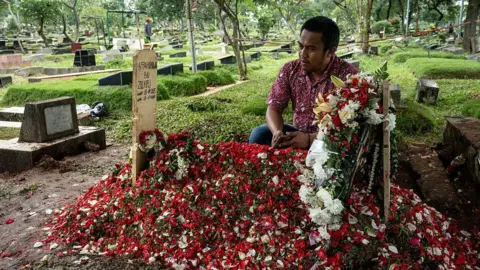More than 1,000 children have fallen ill from free school lunches in Indonesia this week, according to authorities – the latest in a string of mass food poisoning events linked to President Prabowo Subianto's multi-billion-dollar nutritious meals programme.
Yuyun Sarihotima, head of West Java's Cipongkor Community Health Center, told BBC Indonesia that the total number of poisoning victims recorded between Monday and Wednesday had reached 1,171.
This follows the poisoning of 800 students last week in West Java and Central Sulawesi provinces.
President Prabowo has made the nutritious meals programme a signature of his leadership, aiming to offer free lunches to 80 million school children.
However, a spate of mass food poisoning incidents has led NGOs to call for authorities to suspend the programme due to health concerns.
Muhaimin Iskandar, Coordinating Minister for Community Empowerment, stated there are no plans to stop it.
Victims of the recent outbreaks complained of stomach aches, dizziness, and nausea, as well as shortness of breath, which is a non-typical symptom of food poisoning. The meals included soy sauce chicken, fried tofu, vegetables, and fruit, but previous cases have cited negligent food preparation and expired ingredients as causes.
The head of Indonesia's National Nutrition Agency said the mass food poisoning in Cipongkor was the result of a technical error by the Nutrition Fulfillment Service Unit (SPPG), which has reportedly been suspended.
West Bandung regent Jeje Ritchie Ismail stated that the mass poisoning in Cipongkor has been declared an extraordinary event for prompt handling.
As of late September, the National Narcotics Agency reported 4,711 cases of free school lunch poisoning, with the majority occurring on the island of Java. The Indonesian Education Monitoring Network recorded an even higher figure of 6,452 victims.
Some have called for changes to the scheme, proposing direct funds to parents for meal preparation instead, a proposal which the BGN has previously rejected.
Internationally, free meal programs have shown effectiveness in improving health, academic performance, and attendance; however, Indonesia’s program has become a target of food safety concerns and protests.
Despite this, President Prabowo's initiatives have gained political favor, with approval ratings at about 80% shortly after taking office. Observers caution that the program's large budget may encourage corruption among officials.
With additional reporting by Koh Ewe and Hanna Samosir


















